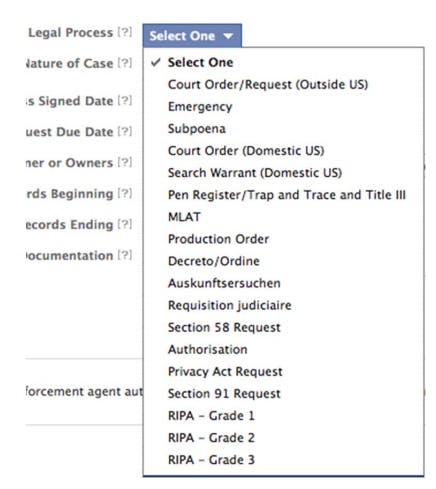Your Facebook profile is a bounty of valuable information—and the U.S. government knows it.
It should come as no surprise, then, that the latest summary report by the social media network indicated another increase in requests for Facebook user account information by the U.S government and law enforcement agencies.
In the first six months of 2016, the Global Government Requests Report indicates that Facebook received 59,229 request form submissions from the U.S. government, a 27 percent rise in demand for user account information.
This information is mostly requested for use in formal police investigations or in court proceedings, but there are a number of key details that every Facebook user should know.
Does Facebook require police to prove they have a right to access user data?
Yes. Any request to Facebook by the government requires formal legal process documentation, usually acquired from a judge—just like if the police wanted to search your home. To get a warrant or court order, the government would have to prove that there was probable cause, or cause to believe that information within your account could be used as evidence in a criminal investigation.
These warrant requests by the government aren’t hard to justify to a judge. Your Facebook profile can reveal the who, what, when, and where of your daily life—an in-depth and detailed account of you. Most people post with abandon, but that information doesn’t go away. It’s stored in troves in Facebook’s servers.
How does Facebook decide whether to hand over user data?
Every time government agents comes to Facebook with a subpoena or warrant, the company claims to “apply a rigorous approach” to “scrutinize each request for legal sufficiency.” This is managed through a dedicated portal.
Through this portal, the agents must authenticate themselves and submit the formal legal process documentation as well as to stipulate the nature of the case. Facebook operates a prioritization system in handling the requests and uses this detail to classify urgency.
How is the data delivered?
Account information requests take three main forms. If the government doesn’t have the necessary documents to acquire your account data, agents can demand a preservation request. This acts as a 90-day hold on all information that pertains to your user account. Emergency submissions can also be made, if the request is urgent and an individual is in “imminent harm” or their life is in danger. Aside from that, normal legal process forms, like warrants and court orders, can be submitted.
What gives the government the authority to obtain user data?
There are a full range of both domestic and non-domestic legal processes to choose from on the simple submission form’s drop-down menu. The most common in the U.S, however, are a subpoena, court order, search warrant, and national security letter (NSL). They vary in the data that they can provide but all are relatively in common use, although NSLs are particularly controversial.
Subpoena
A subpoena will give the requesting government agency access to what Facebook calls “basic subscriber content.” This is limited to a name, email, IP addresses, how long the Facebook account has existed, any attached credit card information, and recent login times. It must be submitted in connection to an official criminal investigation. In the first half of 2016, Facebook received 6,526 subpoena requests and produced data in response to 80.19 percent of these.
National security letter
NSLs are simply a type of subpoena submitted by the federal government in instances concerning national security. They do not require prior approval by a judge. Through these, Facebook will only supply a user’s name and length of service, the company says. In the past, these have also been coupled with a gag order but the new report allows Facebook to include the numbers in batch form, allowing it to indicate that it has received been 0 and 499 NSLs.
Court order
Court orders relevant to an ongoing investigation provide a little more metadata than just basic subscriber content but still won’t result in communications data and private messages being handed over. They make up just 781 requests in the report.
Search warrant
A search warrant is by far the most comprehensive legal course law enforcement can take in acquiring your private information. It delivers content on just about everything you’ve ever done on the website. Facebook is required to hand over a full archive of activity, messages, photos, internal site browsing history, events, shares, and your friends list—for each supplying location data and a time stamp when available. Search warrants are by far the most common course for the government and make up 58 percent of all requests, or 13,742 in the first half of this year.
How do police receive the data?
The Facebook portal provides a dashboard through which law enforcement can access the account information as Facebook makes it available. Usually published in spreadsheet and PDF formats, this highly sensitive information is then entrusted to the government agency to handle and protect it.
Will Facebook tell me if police requested my data?
There is no requirement that Facebook or the government to inform the user that their information has been flagged as a part of a warrant. This is perhaps why the company appears keen to maintain that it ultimately sides with the user in holding to strict policies and standards up to the point when this information leaves the social media company’s possession.
“We scrutinize each request for legal sufficiency, no matter which country is making the request, and challenge those that are deficient or overly broad,” Facebook representatives said in a blog post that accompanied the new report.
“We do not provide governments with ‘backdoors’ or direct access to people’s information,” Facebook continued. “We’ll also keep working with partners in industry and civil society to push governments around the world to reform surveillance in a way that protects their citizens’ safety and security while respecting their rights and freedoms.”



